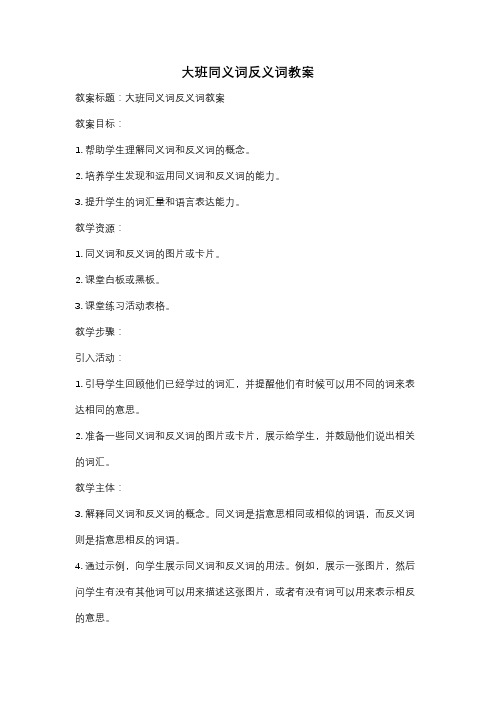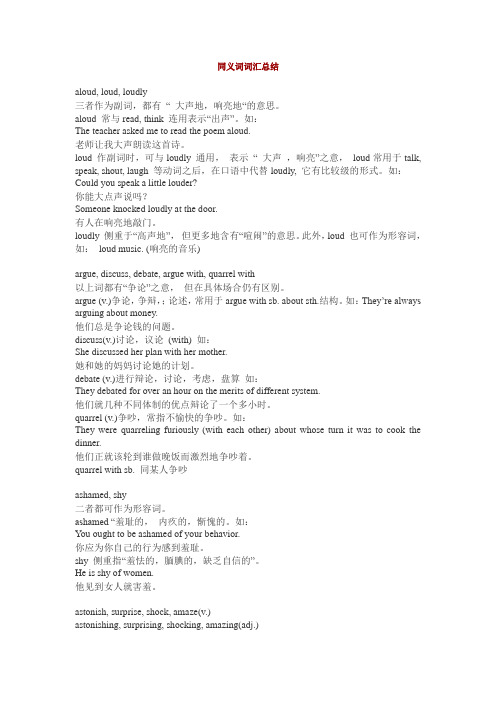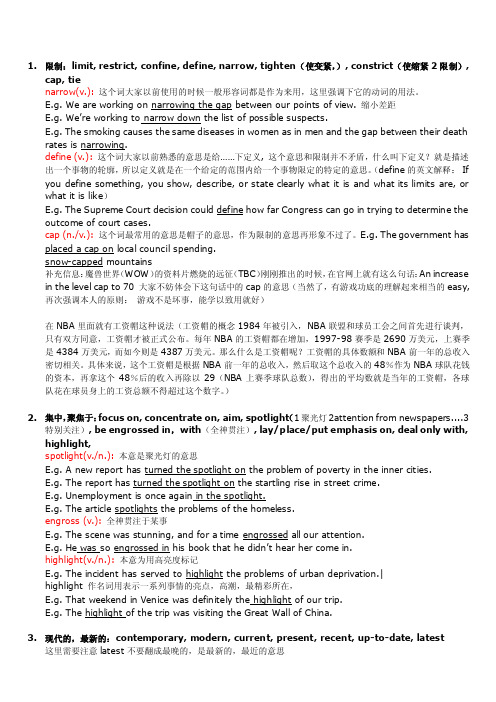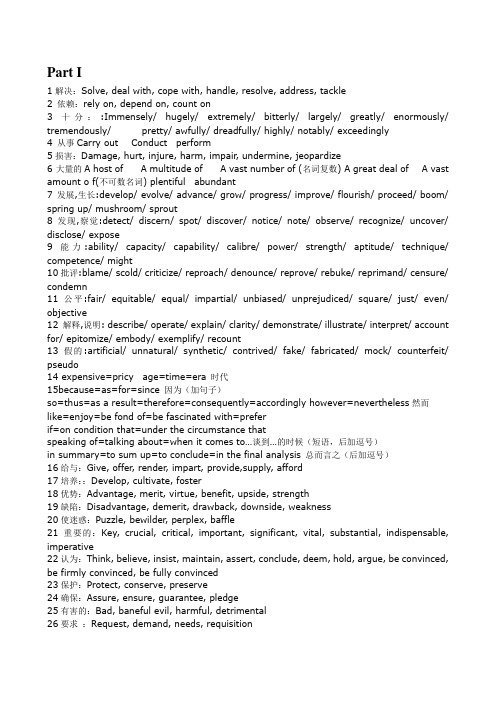总结同义词
大班同义词反义词教案

大班同义词反义词教案教案标题:大班同义词反义词教案教案目标:1. 帮助学生理解同义词和反义词的概念。
2. 培养学生发现和运用同义词和反义词的能力。
3. 提升学生的词汇量和语言表达能力。
教学资源:1. 同义词和反义词的图片或卡片。
2. 课堂白板或黑板。
3. 课堂练习活动表格。
教学步骤:引入活动:1. 引导学生回顾他们已经学过的词汇,并提醒他们有时候可以用不同的词来表达相同的意思。
2. 准备一些同义词和反义词的图片或卡片,展示给学生,并鼓励他们说出相关的词汇。
教学主体:3. 解释同义词和反义词的概念。
同义词是指意思相同或相似的词语,而反义词则是指意思相反的词语。
4. 通过示例,向学生展示同义词和反义词的用法。
例如,展示一张图片,然后问学生有没有其他词可以用来描述这张图片,或者有没有词可以用来表示相反的意思。
5. 引导学生积极参与,提出他们自己的同义词和反义词。
鼓励他们解释为什么选择了这些词汇。
巩固练习:6. 分发课堂练习活动表格,上面列出一些常见的词汇,要求学生填写相应的同义词和反义词。
7. 让学生互相交流并分享他们的答案,讨论不同的选择和解释。
8. 收集学生的答案,并给予积极的反馈和指导。
拓展活动:9. 分组让学生进行小组活动,每个小组选择一组同义词或反义词,然后设计一个小故事或对话,运用这些词汇展示在不同情境下的用法。
10. 邀请学生分享他们的小故事或对话,并提供反馈和鼓励。
总结:11. 总结本节课学到的知识,强调同义词和反义词的重要性,并鼓励学生在日常生活中积极运用这些词汇。
教案评估:12. 观察学生在课堂练习和小组活动中的参与程度和表现。
13. 收集学生填写的课堂练习活动表格,评估他们对同义词和反义词的掌握程度。
教案扩展:- 可以设计更多的课堂练习活动,如填空题、配对题等,以巩固学生对同义词和反义词的理解和运用能力。
- 可以引导学生自己寻找同义词和反义词,拓展他们的词汇量和语言表达能力。
托福常用同义词总结

托福常用同义词总结以下是一些常用的托福同义词总结:1. important = significant, crucial, essential, vital, critical重要的2. improve = enhance, boost, refine, develop, upgrade改善、提高3. encourage = promote, motivate, inspire, stimulate鼓励、激励4. explore = investigate, examine, study, analyze探索、研究5. advantage = benefit, asset, strength, merit优势、好处6. disadvantage = drawback, drawback, weakness, flaw劣势、缺点7. argue = claim, assert, contend, state争论、主张8. solve = resolve, tackle, address, deal with解决9. discuss = debate, deliberate, consider, talk about讨论理解11. support = back, endorse, uphold, advocate支持12. oppose = disagree, object, dissent, resist反对13. benefit = advantage, gain, profit, benefit益处、利益14. disadvantage = drawback, downside, weakness, flaw劣势、缺点15. facilitate = enable, promote, assist, make easier促进、帮助16. impact = effect, influence, consequence, result影响、效果这些同义词的使用可以使你的写作和口语更加流畅,从而提高整体的语言表达能力。
同义词词汇短语辨析总结

同义词词汇总结aloud, loud, loudly三者作为副词,都有“ 大声地,响亮地“的意思。
aloud 常与read, think 连用表示“出声”。
如:The teacher asked me to read the poem aloud.老师让我大声朗读这首诗。
loud 作副词时,可与loudly 通用,表示“ 大声,响亮”之意,loud常用于talk, speak, shout, laugh 等动词之后,在口语中代替loudly, 它有比较级的形式。
如:Could you speak a little louder?你能大点声说吗?Someone knocked loudly at the door.有人在响亮地敲门。
loudly 侧重于“高声地”,但更多地含有“喧闹”的意思。
此外,loud 也可作为形容词,如:loud music. (响亮的音乐)argue, discuss, debate, argue with, quarrel with以上词都有“争论”之意,但在具体场合仍有区别。
argue (v.)争论,争辩,;论述,常用于argue with sb. about sth.结构。
如:They‟re always arguing about money.他们总是争论钱的问题。
discuss(v.)讨论,议论(with) 如:She discussed her plan with her mother.她和她的妈妈讨论她的计划。
debate (v.)进行辩论,讨论,考虑,盘算如:They debated for over an hour on the merits of different system.他们就几种不同体制的优点辩论了一个多小时。
quarrel (v.)争吵,常指不愉快的争吵。
如:They were quarreling furiously (with each other) about whose turn it was to cook the dinner.他们正就该轮到谁做晚饭而激烈地争吵着。
英语四六级同义词总结

1.限制:limit, restrict, confine, define, narrow, tighten(使变紧,), constrict(使缩紧2限制),cap, tienarrow(v.):这个词大家以前使用的时候一般形容词都是作为来用,这里强调下它的动词的用法。
E.g. We are working on narrowing the gap between our points of view. 缩小差距E.g. We’re working to narrow down the list of possible suspects.E.g. The smoking causes the same diseases in women as in men and the gap between their deathrates is narrowing.define (v.):这个词大家以前熟悉的意思是给……下定义, 这个意思和限制并不矛盾,什么叫下定义?就是描述出一个事物的轮廓,所以定义就是在一个给定的范围内给一个事物限定的特定的意思。
(define的英文解释:If you define something, you show, describe, or state clearly what it is and what its limits are, or what it is like)E.g. The Supreme Court decision could define how far Congress can go in trying to determine theoutcome of court cases.cap (n./v.): 这个词最常用的意思是帽子的意思,作为限制的意思再形象不过了。
E.g. The government has placed a cap on local council spending.snow-capped mountains补充信息:魔兽世界(WOW)的资料片燃烧的远征(TBC)刚刚推出的时候,在官网上就有这么句话:An increase in the level cap to 70 大家不妨体会下这句话中的cap的意思(当然了,有游戏功底的理解起来相当的easy,再次强调本人的原则:游戏不是坏事,能学以致用就好)在NBA里面就有工资帽这种说法(工资帽的概念1984年被引入,NBA联盟和球员工会之间首先进行谈判,只有双方同意,工资帽才被正式公布。
议论文同义词总结

Part I1解决:Solve, deal with, cope with, handle, resolve, address, tackle2 依赖:rely on, depend on, count on3 十分::Immensely/ hugely/ extremely/ bitterly/ largely/ greatly/ enormously/ tremendously/ pretty/ awfully/ dreadfully/ highly/ notably/ exceedingly4 从事Carry out Conduct perform5损害:Damage, hurt, injure, harm, impair, undermine, jeopardize6 大量的A host of A multitude of A vast number of (名词复数) A great deal of A vast amount o f(不可数名词) plentiful abundant7 发展,生长:develop/ evolve/ advance/ grow/ progress/ improve/ flourish/ proceed/ boom/ spring up/ mushroom/ sprout8 发现,察觉:detect/ discern/ spot/ discover/ notice/ note/ observe/ recognize/ uncover/ disclose/ expose9 能力:ability/ capacity/ capability/ calibre/ power/ strength/ aptitude/ technique/ competence/ might10批评:blame/ scold/ criticize/ reproach/ denounce/ reprove/ rebuke/ reprimand/ censure/ condemn11 公平:fair/ equitable/ equal/ impartial/ unbiased/ unprejudiced/ square/ just/ even/ objective12 解释,说明: describe/ operate/ explain/ clarity/ demonstrate/ illustrate/ interpret/ account for/ epitomize/ embody/ exemplify/ recount13 假的:artificial/ unnatural/ synthetic/ contrived/ fake/ fabricated/ mock/ counterfeit/ pseudo14 expensive=pricy age=time=era 时代15because=as=for=since 因为(加句子)so=thus=as a result=therefore=consequently=accordingly however=nevertheless然而like=enjoy=be fond of=be fascinated with=preferif=on condition that=under the circumstance thatspeaking of=talking about=when it comes to…谈到…的时候(短语,后加逗号)in summary=to sum up=to conclude=in the final analysis 总而言之(后加逗号)16给与:Give, offer, render, impart, provide,supply, afford17培养::Develop, cultivate, foster18优势:Advantage, merit, virtue, benefit, upside, strength19缺陷:Disadvantage, demerit, drawback, downside, weakness20使迷惑:Puzzle, bewilder, perplex, baffle21重要的:Key, crucial, critical, important, significant, vital, substantial, indispensable, imperative22认为:Think, believe, insist, maintain, assert, conclude, deem, hold, argue, be convinced, be firmly convinced, be fully convinced23保护:Protect, conserve, preserve24确保:Assure, ensure, guarantee, pledge25有害的:Bad, baneful evil, harmful, detrimental26要求:Request, demand, needs, requisition27消除:Eliminate, clear, remove, clear up, take away, smooth away28导致:Lead to, bring about, result in, cause, spark off, conduce to, procure, induce, generate29因此:So, therefore, thus, hence, consequently, as a consequence, accordingly, as a result, because of this, as a result of this30急剧地:Dramatically,drastically,sharply,hugely,enormously,steeply,substantially,considerably,significantly,markedly,surprisingly,strikingly,radically,remarkably,vastly,noticeably31平稳地:Steadily,smoothly,slightly,slowly,marginally,gradually,moderately,mildly 32宣称:Allege, assert, declare, claim33发生:Happen, occur, take place34原因:Reason, factor, cause35发展:Development, advance, progress36有益的:Useful, helpful, beneficial, profitable, rewarding,advantageous37影响:Influence, impact, effect38明显的:Clear, obvious, evident, self-evident, manifest, apparent, crystal-clear39与…相比:Compared with,compared to,in comparison with,in comparison to,by comparison with,by comparison to40对比而言:By contrast,in contrast,on the other hand,on the contrary,conversely41人类The human race Humanity Humankind42 在当代In contemporary society In present-day society In this day and age43原因:reason/ factor/ contributor/ origin/ explanation/ excuse44结果:result/ outcome/ upshot/ consequence/ implication45由于,因为:result from/ arise from/ originate from/ be due to/ be owing to/ thanks to/ on account of/ develop from/ be ascribed to/ be attributed to46问题,障碍:obstacle/ bar/ barrier/ barricade/ block/ blockage/ obstruction/ hurdle/ issue/ hamper/ hindrance/ snag47困难:difficulty/ plight/ handicap/ hardship/ challenge/ complication/ dilemma/ perplexity/ trouble48冲突,争端:disagreement/ dispute/ disharmony/ conflict/ argument/ contention/ debate/ controversy/ confrontation/ hassle/ rub/ clash/ friction/ contradiction49展示:Show, reveal, illustrate, demonstrate, depict, present, represent, describe50大约:Approximately,almost,about,around,nearly,roughly51事实上:Practically,in practice,essentially,in essence,in reality,in effect,in fact,asa matter of fact,it is a fact that52 政府:nations, countries, authorities, politicians53 花费:allocate, give, allot, provide, budget, make available, waste, award54钱= budgets, taxes, resources,55 Problems = concerns, issues, worries, disasters, threats, threatening, war, famine, poverty, education, homelessness, drugs, global warming56big=massive(large in size, quantity, or extent), colossal(use this word, you emphasize something’s large), tremendous(INFORMAL)57 always=invariably(the same as always, but better than always)Part II☆developevolve, advance, grow, improve, progress, flourish☆difficultyhandicap, hardship, adversity, challenge, complication, dilemma, perplexity, plight, trouble ☆earlyfirst, old, ancient, primitive, previous, former, remote☆finddiscover, come across, encounter, hit on, expose, notice, note, observe, recognize, spot, uncover☆futurewhat's next, prospect, approaching, expected, destined, forthcoming☆inevitableunavoidable, certain, destined, fated, inescapable, sure☆militantarmed, belligerent, army, weapon, warlike☆objectioncommercial challenge, complaint, disapproval, opposition, protest, query, question, remonstration☆obstaclebar, barricade, barrier, block, blockage, check, obstruction, problem, snag, hurdle☆prevalentcommon, usual, prevailing, widespread, systematic, collective, general, popular☆reducecurtail, cut, decrease, halve, impair, lessen, moderate, trim, slash☆rolefunction (provide, support, weaken, smooth, solve), job, position, duty, post, task, contribution☆recentmodern, current, now, nowadays, today, contemporaneous, new, novel, present, up-to-date ☆simulatevirtual, create, reproduce, pretend, imitate☆significanceimportance, milestone, impact, justification, gist, implication, point, purport, vital business, economic, financial, mercantile, profitable, pecuniary☆worldwideinternational, cosmopolitan, global, universal, ubiquitous, widespread, around the world。
英语同义词辨析总结!再也不用为选词头疼了~

英语同义词辨析总结!再也不用为选词头疼了~导读:本文英语同义词辨析总结!再也不用为选词头疼了~,仅供参考,如果觉得很不错,欢迎点评和分享。
ago, before 这两个副词均含“……以前”之意。
ago〓指从现在起往前推算一段时间,始终置于所修饰的词之后,与一般过去时连用。
before〓或指从过去某一时间起向前推算的若干时间的以前,通常与过去完成时连用;或泛指以前,并不具体指若干时间以前,可使用现在完成的或过去时;还可指从将来某一时间起的若干时间以前。
agony, auguish, torment, torture, grief, misery, distress, sorrow 这些名词均有“苦恼、痛苦”之意。
agony〓侧重指精神或身体痛苦的剧烈程度。
auguish〓指精神方面令人难以忍受的极度痛苦;用于身体时,多指局部或暂时的痛苦。
torment〓强调烦恼或痛苦的长期性。
torture〓语气比toment强,指在精神或*上受到的折磨所产生的痛苦。
grief〓指由某种特殊处境或原因造成的强烈的感情上的苦恼与悲痛。
misery〓着重痛苦的可悲状态,多含不幸、可怜或悲哀的意味。
distress〓多指因思想上的压力紧张、恐惧、忧虑等所引起的精神上的痛苦,也可指某种灾难带来的痛苦。
sorrow〓语气比grief弱,指因不幸、损失或失望等所产生的悲伤。
agree, consent, approve, comply, subscribe 这些动词均含“同意、赞同”之意。
agree〓普通用词,侧重指对某事同其他人有相同的意见或想法。
consent〓指同意别人的请求、建议或满足他人的愿望,着重意愿或感情,常和to连用。
approve〓侧重对认为正确或满意的事表示赞同或批准。
作不及物动词用时,常与of连用。
comply〓指答应某人已经提出或可能要求做的某事,与with 连用。
subscribe〓指完全地赞成已阐明的立场。
词汇同义替换与考点总结

词汇同义替换与考点总结在英语学习中,词汇的掌握是非常重要的,而同义替换是一个有效的方法来丰富我们的词汇量。
本文将介绍词汇同义替换的概念和技巧,并总结一些常见的考点以帮助读者更好地应对英语考试。
一、词汇同义替换的概念词汇同义替换是指将一个词或短语替换成具有相同或类似意义的另一个词或短语,以达到增强表达效果、避免重复使用的目的。
同义替换可以在口语和写作中都有用武之地,因此掌握这一技巧对于英语学习者来说极其重要。
二、词汇同义替换的技巧1. 同义词替换:找到与原词意思相近或相同的同义词。
例如,替换"big"可以使用"large"或"huge"。
2. 反义词替换:将原词的相反意义表达出来。
例如,替换"happy"可以使用"unhappy"。
3. 词组替换:将原词替换成具有相同意义的词组或短语。
例如,替换"make a decision"可以使用"reach a conclusion"。
4. 转换词性:将一个词的词性转换为另一个词性。
例如,替换"advantage"可以使用"benefit"。
5. 同根词替换:使用与原词有相同词根的词替换。
例如,替换"economic"可以使用"economical"。
三、常见考点总结以下是一些常见的考点,我们可以通过词汇同义替换来应对这些考点。
1. 同义词考点:在阅读理解和填空题中,考察对同义词的理解和使用。
2. 反义词考点:考察对反义词的掌握和使用,例如在词汇题和阅读理解中。
3. 词组替换考点:在阅读理解和填空题中,考察对词组替换的理解和运用。
4. 词性转换考点:在填空题和翻译题中,考察对词性转换的运用能力。
5. 同根词考点:在词汇题和阅读理解中,考察对同根词的辨析和使用能力。
初中英语同义词近义词归纳

初中英语同义词近义词归纳在学习英语的过程中,我们会遇到许多同义词和近义词。
它们的存在既给我们的语言表达提供了更多的选择,也给我们造成了一些困扰。
因此,了解和掌握同义词和近义词的用法是非常重要的。
本文将为大家归纳总结一些常见的初中英语同义词和近义词,并介绍它们的区别和用法。
1. begin/start这两个词都表示“开始”的意思,但在使用上略有不同。
在描述一项活动或事件发生时,我们通常用"begin",例如:The concert begins at7pm(音乐会将于晚上7点开始)。
而在提到开始一个行为或一项工作时,我们倾向于使用"start",例如:I will start studying for the exam tomorrow(我明天将开始为考试而学习)。
2. buy/purchase这两个词都表示“购买”的意思,但在语气和用法上略有区别。
"buy" 是日常用词,更加口语化,用于描述一般的购买行为。
而"purchase" 更正式一些,多用于商务或正式场合中。
例如:I bought a new book at the bookstore(我在书店买了一本新书);He purchased a new car from the dealership(他在经销商那里购买了一辆新车)。
3. friendly/kind这两个词都表示“友好的”意思,但注重点略有不同。
"friendly" 更侧重于表达人际关系中的友好和亲切,强调待人友善和和蔼可亲。
而"kind" 更强调善良和乐于助人的态度。
例如:She is a friendly personand always greets everyone with a smile(她是一个友好的人,总是带着微笑向每个人打招呼);He is a very kind-hearted person and often helps others in need(他是一个非常善良的人,经常帮助有困难的人)。
- 1、下载文档前请自行甄别文档内容的完整性,平台不提供额外的编辑、内容补充、找答案等附加服务。
- 2、"仅部分预览"的文档,不可在线预览部分如存在完整性等问题,可反馈申请退款(可完整预览的文档不适用该条件!)。
- 3、如文档侵犯您的权益,请联系客服反馈,我们会尽快为您处理(人工客服工作时间:9:00-18:30)。
总结同义词
同义词是指词语中有着相同或相近意义的词汇。
在语言表达中,使用同义词可以丰富词汇,增强表达的准确性和多样性。
下面是一些常见的同义词的总结:
1. 喜欢/喜爱:热爱、喜好、钟爱、宠爱
2. 感激/感谢:感谢、谢谢、感激、感恩
3. 美丽/漂亮:美丽、漂亮、好看、迷人、秀丽
4. 快乐/高兴:开心、快乐、愉快、欢喜、喜悦
5. 懒惰/懒散:懒惰、懒散、懒洋洋、慵懒
6. 聪明/聪慧:聪明、聪慧、伶俐、聪悟、智慧
7. 困惑/迷茫:困惑、迷茫、迷惘、蒙圈、茫然
8. 紧张/焦虑:紧张、焦虑、不安、担忧、心烦
9. 勇敢/勇于:勇敢、勇敢、大胆、果敢、坚定
10. 烦恼/苦恼:烦恼、苦恼、困扰、忧心、忧愁
11. 热情/热忱:热情、热忱、热心、热爱、热烈
12. 气候/天气:气候、天气、气象、气温、气象
13. 生活/生存:生活、生存、存在、生计、生命
14. 工作/职业:工作、职业、工种、岗位、行业
15. 危险/风险:危险、风险、风险、险恶、威胁
16. 食物/饮食:食物、饮食、食品、餐饮、口粮
17. 学习/教育:学习、教育、培训、进修、训诲
18. 情绪/心情:情绪、心情、心绪、心境、意绪
19. 虚假/谎言:虚假、谎言、欺骗、诈骗、骗局
20. 生气/愤怒:生气、愤怒、发火、气愤、恼火
这些同义词的使用可以根据具体语境和表达需求进行合理搭配。
同时,对于同义词的熟练运用需要通过阅读、写作和实际应用来提升。
掌握不同的同义词可以使语言表达更加精准,增加语言的丰富性,让表达更加准确、清晰和生动。
同时,了解同义词还可以帮助我们在阅读时更好地理解和解析文章的意思。
因此,合理使用同义词是提高语言表达能力和彰显语文水平的一个重要方面。
